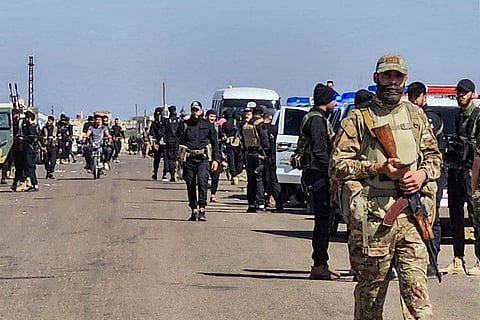All you need to know about what’s happening in Syria’s Sweida — and why Israel is bombing the country
Deadly clashes inDruze heartland spark Israeli airstrikes, raise fears of escalation

Dubai: A deadly flare-up in Syria’s southern province of Sweida — home to the country’s Druze minority — has triggered regional alarm, international mediation and Israeli airstrikes.
As clashes between Druze factions and Bedouin tribes spiralled into a broader confrontation involving Syrian government forces, Israel claimed it is acting to defend the Druze. Damascus has rejected that justification and accused Israel of exploiting the conflict to advance its own military objectives.
The United Arab Emirates has welcomed the announcement of a ceasefire in Sweida, emphasising the importance of de-escalation, the protection of civilians, and support for efforts aimed at restoring security and stability in the region.
Furthermore, the UAE strongly condemned the dangerous escalation in southern Syria and firmly denounced the Israeli airstrikes in the area, reaffirming its categorical rejection of violations that undermine Syria’s sovereignty, security, and stability.
Russia condemned days of strikes by Israel on Syria, saying they violated the fractured country’s sovereignty.
“These attacks, which constitute a gross violation of the country’s sovereignty and international law, deserve strong condemnation,” Russia’s foreign ministry said in a statement.
China called for respect of Syria’s sovereignty after Israel carried out strikes on the country’s forces in support of the Druze minority.
Here’s what we know:
What triggered the violence in Sweida?
Clashes erupted on Sunday between Druze fighters and local Bedouin tribes, rooted in long-standing tensions in southern Syria, after the kidnap of a Druze vegetable vendor. The violence quickly escalated, killing more than 100 people in the early days. The Syrian army deployed forces to “restore security,” but Druze leaders accused them of siding with Bedouin militias.
How many people have been killed so far?
More than 350 people have died in the past week, according to the UK-based Syrian Observatory for Human Rights. Local sources and Druze leaders report that civilians were among the dead, with incidents of executions, looting, and homes being burned after Syrian troops entered Druze-controlled areas.
Why did the Syrian army enter Sweida?
The Syrian government initially said it was intervening to enforce a ceasefire and protect civilians. However, multiple witnesses said government troops and allied Bedouin tribes attacked Druze factions instead. This led to widespread outrage and accusations of betrayal from Druze spiritual leaders.
What has the Syrian government said since?
On Thursday, interim President Ahmed Al Sharaa announced that military operations in Sweida had been halted and that forces were beginning to withdraw. He said that security responsibility would be handed over to Druze religious elders and local factions. Al Sharaa vowed to hold accountable those who harmed the Druze, calling the community a “fundamental part of the nation.”
What is Israel’s role in this conflict?
Israel began bombing Syrian military sites in Sweida and around Damascus on Monday, saying it was acting to protect Syria’s Druze minority. Israel has warned it will continue and escalate its strikes if Syrian forces remain in the region, particularly near the Golan Heights, which Israel has occupied since 1967.
Why does Israel say it cares about Syria’s Druze?
Israel is home to about 153,000 Druze citizens, most of whom serve in the Israeli military and police. In contrast to other minority communities within Israel’s borders, Druze men over 18 have been conscripted to the Israeli military since 1957 and often rise to positions of high rank, while many build careers in the police and security forces.
The Israeli government had also unilaterally declared a demilitarisation zone in Syria that “prohibits the introduction of forces and weapons into southern Syria,” according to the Israeli Prime Minister’s office.
The Syrian government has rejected Israel’s declaration of a demilitarised zone and has, along with the international community, repeatedly called on Israel to cease military actions that violate its sovereignty.
Israeli leaders, including Prime Minister Netanyahu and Defence Minister Israel Katz, have described the Druze as “brothers-in-arms” and say their country has a moral obligation to protect Druze across the border.
How have Druze in Syria and Lebanon responded to Israel’s claim?
Most Druze leaders outside Israel have rejected its interventions as opportunistic. They affirm loyalty to a united Syria and accuse Israel of using the Druze issue to justify military expansion near the border.
What role did international powers play in preventing further escalation?
President Al Sharaa credited American, Arab and Turkish mediation with preventing a broader war after Israel’s initial strikes. He accused Israel of targeting both civilian and government infrastructure, suggesting the situation could have spiraled without external diplomatic pressure.
What is the status of the Druze armed groups now?
During the civil war, the Druze in Sweida formed self-defence militias. Two of the largest groups — the Men of Dignity and the Mountain Brigade — have expressed willingness to join Syria’s new national army, but they say the state has delayed integrating them. The government’s recent actions have cast doubt on the sincerity of that process.
What does the future hold for the Druze in Syria?
Uncertainty remains high. While a fragile ceasefire is in place, tensions between Druze fighters, Bedouin tribes and government forces are unresolved. Many Druze fear marginalisation under Syria’s new Islamist authorities and are calling for protection — but not foreign intervention.
Sign up for the Daily Briefing
Get the latest news and updates straight to your inbox




